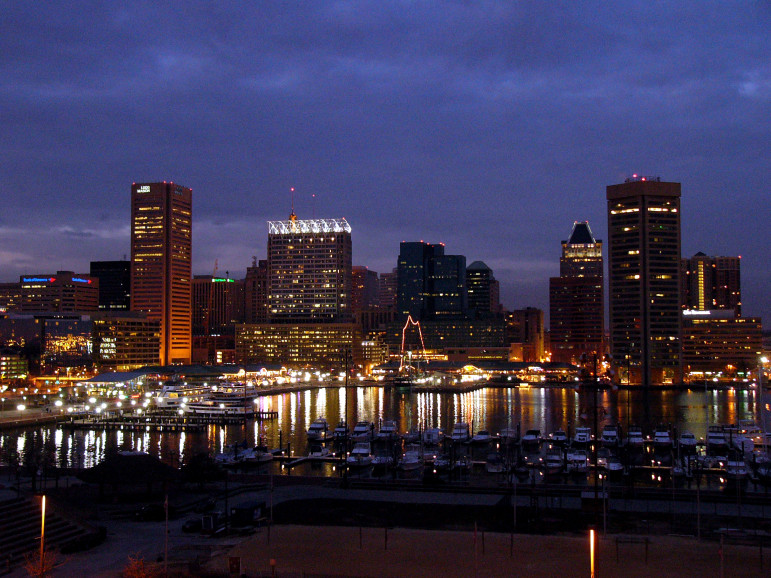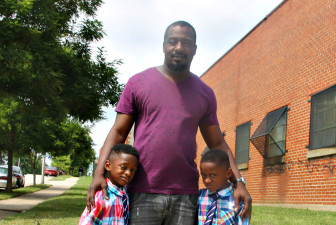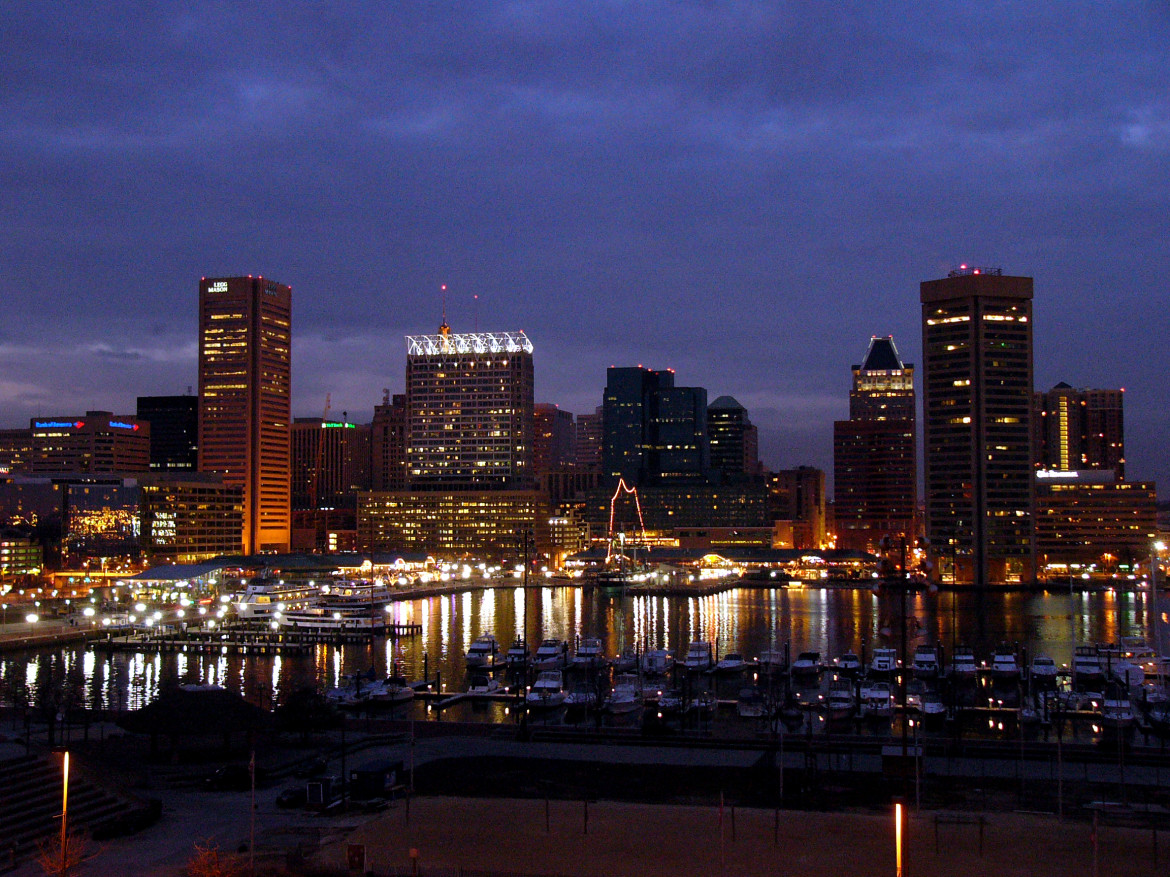
Kathleen Conklin / Flickr
To its detractors, Baltimore's new curfew represents “virtual house arrest,” in the words of a staff attorney for the American Civil Liberties Union of Maryland.
BALTIMORE — Call it a tale of two curfews.
To its proponents, Baltimore’s newly approved youth curfew, one of the strictest in the nation, will provide an effective way to keep kids off the streets late at night, making them less likely to become victims or perpetrators of violence. Supporters also say the curfew will help connect vulnerable children and their families with an array of city, state and community services to help them.
To its detractors, however, the curfew represents “virtual house arrest,” in the words of a staff attorney for the American Civil Liberties Union of Maryland. And some African-American residents see the curfew as a potential tool of repression that will lead to police harassing black youths in low-income neighborhoods.
Despite protests and chants of “no youth curfew,” the Baltimore City Council approved the curfew, 13-2, on June 2.
City Councilman Brandon Scott, a Democrat who sponsored the legislation that led to the curfew, said he took inspiration from a curfew in Kansas City, Mo. He traveled there last summer to check out that city’s curfew and its recreation and parks program.
Scott said he liked the idea that the curfew there imposes different hours for the school year and the rest of the year, as Baltimore’s curfew will, but wasn’t a fan of geographic restrictions that forbid youths to be in parts of KC’s entertainment districts during some hours.
Baltimore police officers trained to focus on youths violating the curfew – which will start as early as 9 p.m., for some youths — will ask for school or other identification proving age, and transport those found to be in violation of the curfew to one of two initial “Youth Connection Centers” to be located in East and West Baltimore. There, the youths will be interviewed and will remain until parents or guardians pick them up.
The centers – the city of about 620,000 eventually plans to operate nine of them, one in each police district – will be staffed by employees and volunteers who will strive to identify youth and family needs that could be addressed by state, city or community health, mental health and social services providers.
“Old-school rules for Baltimore City”
“This is really about connecting our most vulnerable children and their families to services,” Scott told JJIE.
He called the curfew, expected to replace a much less-restrictive one in August, a way of “bringing back some old-school rules for Baltimore City that we know can be effective if we do it the right way.”
Scott stressed that youths will not be handcuffed, arrested or charged criminally, as did Mayor Stephanie Rawlings-Blake, a Democrat who succeeded current Maryland Gov. Martin O’Malley as Baltimore mayor and was elected to her first full term in November 2011.
Speaking of the curfew at a news conference, Rawlings-Blake said: "I am not willing to gamble on the lives of our children. ... This is about taking them out of harm's way."
But, the mayor said: "Let me be clear: This is not a criminal enforcement act by the police. Children will not entered into the criminal justice system for merely violating curfew.”
Caron Brace, a spokeswoman for Rawlings-Blake, said the mayor would sign the curfew legislation at a ceremony.
With a few exceptions, including going to or returning from religious services, work or recreation events, the expanded curfew will forbid children under 14 from being outside without an adult from 9 p.m. to 6 a.m. year-round. Youths ages 14 to 16 will be forbidden to be outside without an adult from 10 p.m. to 6 a.m. weeknights during the school year and 11 p.m. to 6 a.m. on weekends and in summertime.
Under the city’s existing curfew, all youths under 17 can be outside unaccompanied by an adult until 11 p.m. weeknights and midnight on weekends.
A daytime curfew for youths under 16 also will be expanded during school days to 7:30 a.m. to 3 p.m. but will include an exception for children traveling to or from school. (The current daytime curfew during the school year is from 9 a.m. to 2:30 p.m.)
Parents or guardians of children taken to one of the Youth Connection Centers must agree to undergo city-approved family counseling sessions — or face possible fines of up to $500 and/or community service.
Baltimore police officers assigned to pick up curfew violators will transport them in Police Athletic League vans to one of the centers.
There, children will be fed and have access to recreation, fitness rooms, televisions and computer labs.
When a child under 13 is taken to a center for violating curfew, a staffer will automatically call Child Protective Services in the Baltimore City Department of Social Services, Angela Johnese, director of Mayor’s Office on Criminal Justice, told JJIE. And any youth found in violation of the curfew for whom a parent or guardian cannot be located will be referred to Child Protective Services, Johnese said.
While a curfew in Baltimore City has existed for nearly 20 years, it has never had what Johnese called a “wrap-around, service approach,” as the new one will. “We envision the Youth Connection Centers to evolve into a one-stop shop for youth-related services for each and every youth in the city,” she said in an e-mail.
School records will be used to confirm identifications of schoolchildren not carrying IDs.
Internal records will be kept by the city to track repeat curfew violators who may need additional attention, but Johnese said no juvenile justice or school system records of curfew violations will be kept.
She also said police officers have been told not to give chase if a suspected curfew violator flees.
While some parents criticized the curfew, others embraced it.

Gary Gately / JJIE
Danyel Edney — a 39-year-old Baltimore man shown with his 6-year-old sons, Dakari, left, and Damani, right — said he favors the city’s newly approved youth curfew. Edney said the curfew will help keep children from becoming victims or perpetrators of violence.v
Danyel Edney — a 39-year-old father of two twin 6-year-old boys and a 4-year-old daughter, all of whom he takes care of — pointed out children have become victims of violence on the streets of Baltimore, one of the most violent cities in the country.
“With the children, when the children start getting hurt, you really start to realize it’s happening at nighttime,” said Edney, walking with his sons, Dakari and Damani, on a recent afternoon after their graduation from kindergarten at a Northeast Baltimore elementary school.
Speaking of city children under 17, he said, “There’s no need for them to be outside at nighttime, and the sad thing is there’s a lot of children committing the crimes also, so that’s another reason that [the curfew] will decrease crime.”
Along with Kansas City, cities including Miami, Chicago, Detroit, Dallas, Los Angeles, Philadelphia, Washington and Houston have imposed youth curfews. Indianapolis, Oakland, and Austin, Texas, also have been debating youth curfews.
Curfew “creates more problems than it solves”
But Sonia Kumar, the staff attorney for the ACLU of Maryland, said she did not know of any other cities with a youth curfew as early as 9 p.m. or any other curfew laws that include a family counseling component.
“One of things that seems deeply problematic to us is just the assumption that simply because a young person is out at what is now a very early curfew hour … that necessarily means that the kid is doing something wrong or the family is neglectful and needs counseling,” Kumar said in an interview.
In a five-page letter to the Baltimore City Council last month, before final passage of the new curfew law, Kumar wrote, “Putting kids under virtual house arrest creates more problems than it solves.”
Kumar told JJIE the curfew will infringe upon parental rights.
“It’s really depriving parents of the ability to make individual choices about what is best for their kid based on that kid, and there might be 13-year-olds who are just way more mature than 16-year-olds,” she said. “The parent should be able to have the ability to make those judgments about what their kids need to be healthy and supported.”
Kumar also said social services officials already have the ability to intervene in cases of suspected abuse or neglect of a young child.
The Maryland ACLU and nine other advocacy groups, including those representing youths as well as homeless and disabled people, proposed an alternative to the curfew in a six-page open letter in late May.
It called for, among other things, making the Youth Connection Centers “youth-friendly” and not associated with law enforcement or curfew violations; increasing the availability of safe activities for youths; and working with youth experts to identify children and families who need services.
“There are far more effective ways [than the expanded curfew] and ways that have been documented of connecting young people to services effectively,” Kumar said.
Like some residents, Kumar also said the curfew could worsen already strained relationships between police and residents of some neighborhoods.
“Especially in Baltimore, there’s a real long track record of distrust between communities and police,” she said. “The curfew proponents are really choosing to ignore what those interactions are like, certainly for young people.”
In her letter to the council, Kumar called the ID requirement particularly troubling. “In effect,” she wrote, “this provision seems to create a ‘carry-your-papers law’ – not only for young people subject to the curfew, but also anyone who a police officer might ‘reasonably suspect’ to be young enough to be subject to the curfew.”
Longtime Baltimore civil rights leader Marvin “Doc” Cheatham acknowledges many parents in the city need help with parenting skills, but says the new curfew is not the answer.
“Many of our adults need training; they don’t know how to be parents,” Cheatham said. “I mean, you’ve got children raising children. ... We have a problem with parental issues and we need programs to better teach our parents how to be better parents.”
Cheatham also says the city needs to expand recreation opportunities for children. He points out that a recreation center near the West Baltimore community for which he serves as president of the large community association closed about four years ago, and said plenty of men in the community would be willing to help out with, say, coaching sports or teaching children to read.
He said the recreation center should be reopened — and stay open at night until midnight.
Rawlings-Blake came under criticism last year for closing about 20 of some 55 city recreation centers as part of a plan to eventually open more modern ones.
Johnese, the director of the Mayor’s Office on Criminal Justice, noted the city Department of Recreation and Parks recently launched a midnight basketball league and is considering extending hours in some recreation centers.
Some residents fear curfew will target blacks
Kimberly Ellis, a West Baltimore mother of two boys — James, 15, and Edward, 17 — worried that the curfew will result in African-American children being harassed by police in a city where about 64 percent of the population is black.
“There’s no substantive value in increasing minority child interaction with a police department … when you have statistics that show if a minority youth comes across or has an interaction with a police officer, that he’s more than likely to have another interaction with a police officer,” Ellis said.
“I can’t explain it to someone who doesn’t experience it, but to be walked up on by a police officer who has a gun is a very intimidating experience, especially for a child.”
Johnese, responding to concerns about disproportionate minority contact, said in an e-mail: “We understand there is a fear of widening the net or disproportionate enforcement of the law for youth of color. As the Mayor’s Office on Criminal Justice, we are actively involved with local and statewide initiatives to reduce disproportionate minority contact in the juvenile justice system in the city, and every effort is being put into ensuring that the curfew does not negatively impact our children.”
The mayor’s office, through Johnese, said enforcement of the existing curfew has not led to hostile interactions between youth and police.
But Sharon Black, a member of the Baltimore People’s Power Assembly, an advocacy group for poor people, said she believed the curfew would disproportionately target African-American youths.
“Our primary objection to it has been that it would increase repression against young people in the city who already are profiled and criminalized, and we think the problems of young people would be better solved by funding recreation centers, jobs and services for parents as opposed to a very repressive curfew,” Black told JJIE.
“We don’t believe that the police are going to go in wealthy neighborhoods [to enforce the curfew],” she said. “It’s going to be primarily West Baltimore, East Baltimore. The poor communities will end up being targeted, which are mainly African-American.”
And an organization that runs a drop-in center for homeless youths and works to end youth homelessness in Baltimore said they, too, will be targeted by police.
“If they’re out, they’re going to be targeted,” Lara Law, program director at the Youth Empowered Society – YES Drop-In Center, told JJIE. She noted homeless youth typically don’t have IDs and said, “They’re certainly going to have a lot of run-ins with the police around this curfew.”
Financial supporters of The JJIE may be quoted or mentioned in our stories. They may also be the subjects of our stories.
